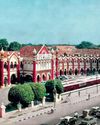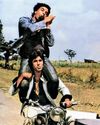
Back in 2005, 54-year-old Mohammad Rajab, like others in Bridhaji village in Pahalgam, left maize cultivation and planted apple trees on his 4.5 kanals of land. Apple farming had brought prosperity to many of his neighbours in the village of 150 households, after many of them converted their maize fields into apple orchards from 2000 onwards. Rajab would arrive early in the morning to tend to his apple trees. He would regularly spray them with pesticides and nutrients and employ scientific techniques such as maintaining 10-20 feet distance between them. When the fruit was ripening, he would stay the night at the orchard to protect it from wild bears. "I nurtured the orchard like a child," says Rajab, in the hope that it would fetch him quality yield and profit. Over the past three years, however, recurrent economic losses have forced Rajab to reconsider apple farming.
"The erratic weather, like abrupt rain in the mornings or evenings or a hailstorm during the flowering season, as well as disease outbreak, have made farming untenable here," says Rajab. Until 2020, the orchard would yield Rajab 450 boxes of the Delicious variety, which earned him nearly Rs 2.5 lakh a year. All that changed when early snow in October 2021 devoured apple orchards across the Valley. The damage in Rajab's orchard is still visible, as 70 trees stand with the support of nuts and bolts. "Since then, my orchard does not yield even 35 per cent fruit. We will axe these 100 apple trees and use them as firewood," says a disheartened Rajab, father of five. "My family does not want me to grow apples any more due to economic losses. Like the others, I am going to plant walnut trees next year. They do not need pesticides or care like apples and are not affected by erratic weather."
This story is from the November 13, 2023 edition of India Today.
Start your 7-day Magzter GOLD free trial to access thousands of curated premium stories, and 9,000+ magazines and newspapers.
Already a subscriber ? Sign In
This story is from the November 13, 2023 edition of India Today.
Start your 7-day Magzter GOLD free trial to access thousands of curated premium stories, and 9,000+ magazines and newspapers.
Already a subscriber? Sign In

He gave the beat to the world
He would pick up the rhythms of each experience of mobility and weave them into his taals. Thus it was that he reflected joy and laughter in rhythmic cycles...such was the magic of Zakir's fingersText and photographs by Raghu Rai

KERALA TOURISM CAMPAIGN, 1989 - TICKETS TO PARADISE
All it took was a catchy tagline-'God's Own Country'-for the world to discover Kerala's wealth of natural beauty. It remains among the best tourism ad campaigns, earning the state a place among top 10 international destinations

SPIRITUALITY - THE GURUS OF COOL
Among the cult Indian gurus, no one had a bigger hold on western minds than 'Osho' Rajneesh. He's also perhaps the role model for the enterprise-building gurus of today

RETAIL SHOPPING - THE MALL MANIA
Shopping malls, a 1990s innovation in India, changed the way the Indian middle class shops. Their success now lies in being 'shoppertainment' destinations, offering something for everyone

CULINARY RENAISSANCE, 1978 - TANDOORI NIGHTS
ITC's Bukhara and Dum Pukht turned the world to tandoori cuisine and had an enormous impact on the F&B industry. Decades on, they are still a pit-stop for celebrities and heads of state visiting Delhi

INDIAN WRITING IN ENGLISH - REVENGE OF THE NATIVE
Rushdie lit the way but Indian writing in English has taken a life of its own in the past few decades, with translated Indian fiction most recently having its moment in the sun

INDIAN ART - A BRUSH WITH GOLD DUST
The 1990s economic liberalisation came as oxygen, lighting up the Indian art scene. Today, artworks by established masters routinely go for astronomical amounts

FESTIVAL OF INDIA, 1982 - CULTURE CAPITAL
The Festival of India grew into a symbol of our 'soft power', introducing our art and aesthetics to a global audience while also helping rebrand our domestic products

THE INDIPOP TREND - DISCO GOES DESI
For ages, the film song ruled. Nothing else was audible. Then came Nazia, charioteered by Biddu, and Indian ears went into a pleasant madness. Literally, Disco Deewane. A whole genre was born

SHOLAY 1975 - THE BIRTH OF THE FANDEMIC
India had seen hits before. But Sholay seared into its collective psyche like a badland bullet. The effect was on a scale never seen before- one film creating a new mass folk culture. And a trail of monster blockbusters that still continues